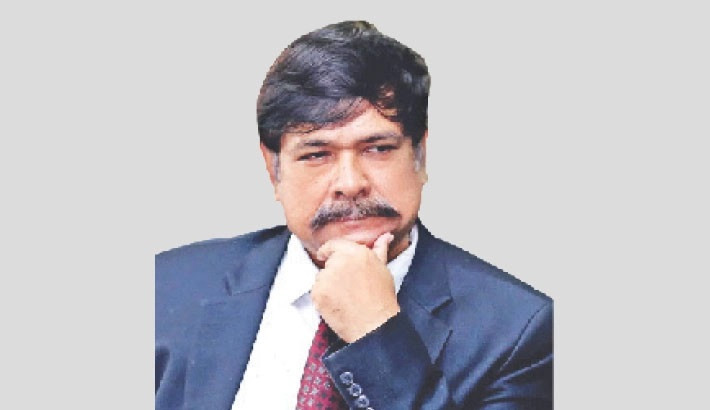
The allegations of corruption against Bangladesh’s former police chief Benazir Ahmed have become the ‘talk of the country’. New accounts of wealth/assets allegedly amassed by the one-time cop head at home and abroad are being discovered almost every day. The amount of land he purchased is the limit.
To their utter astonishment, people see how the topmost police official (who according to the conventional pay scale was able to earn a maximum of Tk two/three crore in his entire career of three decades) hoarded such a huge amount of wealth.
Although it may not be time to say anything final about the allegations brought against him, which are under an Anti-Corruption Commission (ACC) investigation, Benazir’s sudden and mysterious disappearance from Bangladesh testifies to his lack of courage to face the case head-on. It also paves the way for suspicions to be cast on him.
The main reason for the public attention towards Benazir is that he held various highly responsible positions in the government, and gained the government's trust. He was appointed to positions of trust (Commissioner of Dhaka Metropolitan Police, Director General of Rapid Action Battalion (RAB) and finally the Inspector General of Bangladesh Police) for being proficient, loyal and trustworthy at his job.
However, he has absolutely betrayed the trust of the government by allegedly indulging in wholesale corruption and abuse of power.
However, one good thing about Benazir issue is that the government is taking a tougher stance on it. Many of the government spokesmen have overtly condemned Benazir’s corrupt practices and ensured that none would be able to escape justice whoever (s)he may be. The legal measures, so far, taken against Benazir can make us raise our hopes against hopes.
The government of Sheikh Hasina has already proved that they can take action against their own party men for corrupt practices. In the 2019 Casino Scam, the government did not hesitate to take punitive action against their own party activists. Many of the Jubo League and Chhatra League leaders were expelled from the parties and faced arrest and prison.
However, we have not seen similar attempts during the BNP regime. The tenure from 2001 to 2006 was marked by a notorious house known as “Hawa Bhaban” and Tarique Rahman, the son of General Zia and Begum Khaleda Zia, was known as “the Dark Prince of Hawa Bhaban” (Dhaka Tribune, May 22, 2023).
The infamous Bhaban on Banani Road 13 played a vital role in institutionalising corruption and establishing a systematic network of illegal practices throughout the country. It was the political secretariat of the then chairperson of BNP, Begum Zia, which would observe party affairs on behalf of the
chairperson. It took de facto control of the country. The Hawa Bhaban scandal, one of the most prominent cases, entailed illegal money transfers and kickbacks. It exposed a complex web of corruption within the government, and Tarique Rahman took the helm. ‘Hawa Bhaban’, a dark office outside of the regular government structure, became the epicentre of his power and allowed him to exercise unchecked authority.
Within ‘Hawa Bhaban’, Tarique Rahman established a network of highly influential persons, many of whom were implicated in corruption and other unlawful activities. Those individuals often held key government positions or were business or property or media tycoons. ‘Hawa Bhaban’ was instrumental in manipulating state resources for personal gain.
Through the meddling of that house, Tarique Rahman had direct access to government funds, which were often embezzled for political purposes. Due to the rampant corruption, the non-government organisation “Transparency International Bangladesh” (TIB) branded Bangladesh as the world’s most corrupt country for the fifth consecutive year in 2005.
Regrettably, no action was taken to put curbs on Hawa Bhaban’s reckless venality and corruption. And BNP had to pay the price for it. The party which alone won 193 seats out of 300 in the 2001 parliamentary elections was reduced to winning only 23 seats in alliance with other three parties in the elections of 2008.
Sheikh Hasina has been elected the Premier of Bangladesh for the fifth time, and she is the longest-serving female head of the government across the globe.
She has done a great deal for the development of the country. As a matter of fact, she has transformed Bangladesh from a “Basket Case” to “Smart Bangladesh”, which is now one of the fastest-growing economies in the world. People of Bangladesh take pride in what Sheikh Hasina has done for them. However, her government’s drive to curb corruption has not yet lived up to popular expectations. The way the government started combatting the casino case has waned.
Bangladesh has suffered a lot for the long-standing legacy of corruption. Corruption will always be a major hindrance to our sustainable development if not held in check. We can be able to build many more bridges like the Padma Bridge on our own if we can at least reduce corruption to a certain degree. Bangabandhu was a moral crusader who did his utmost to fight against all forms of corruption.
His political and ideological heir Sheikh Hasina will also be, as the people of Bangladesh believe, a moral crusader and fight an uphill battle against the seemingly overwhelming corruption.
The person who had been able to bring the war criminals to justice and execute most of them; and made the Bangabandhu killers stand trial and hang most of them repealing the infamous Indemnity Act fearlessly must give us many good reasons why she can be entrusted with the responsibility of ridding the country of the vile practice of corruption.
_____________________________________
The writer is a distinguished academic, bilingual author and former Vice Chancellor, Islamic University Bangladesh

